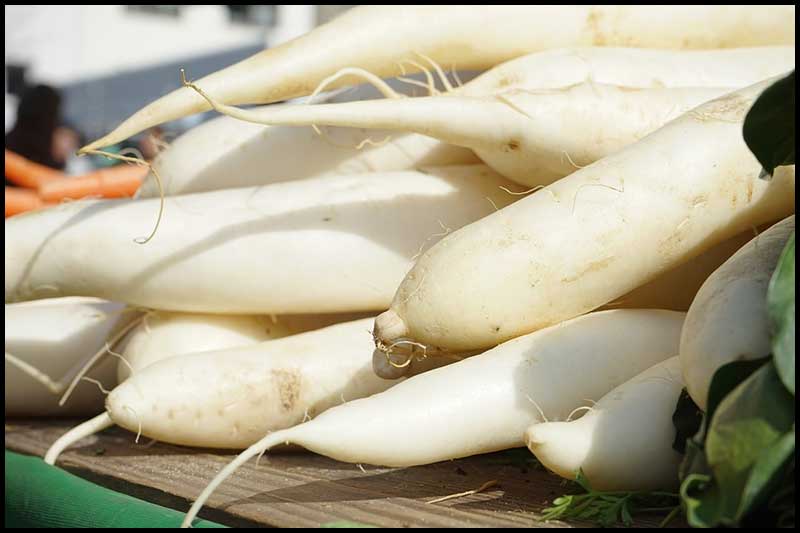Radish is a root crop with a lot of juice and strong or sugary in taste. It is often added to salads and eaten uncooked, heated, or preserved. This vegetable from the Brassica family comes in many shapes and colours. It may be white, purple, or black and larger and oblong in shape. Though some of us might not like radish, we must be aware that it comes with a host of health benefits.
Radish And Diabetes
In a study published in the Journal of Nutritional Science and Vitaminology, results showed that Japanese radish sprouts also referred to as daikon, lowered blood sugar levels in diabetic rats (1).
A review in 2017 looked at the link between radishes (its root juice, extract, and sprouts) and diabetes. Experts have found that radish has a potent antidiabetic activity. It seems to lower down glucose absorption in the intestine and promote glucose uptake, which reduces blood sugar levels. Results demonstrated that this humble veggie’s protective effects are likely related to its ability to improve the body’s antioxidant defense mechanism and positively impact hormonal-triggered glucose changes (2,3).
Radish is also a good source of fiber. Aside from keeping our digestive system moving, fiber helps in managing blood sugar levels. A half-cup serving of radishes contains 1 gram of fiber (4).
Other Health Benefits Of Radish
- Wipe out fungus. It is a natural antifungal agent
- Keep us hydrated as it contains high amounts of water.
- Support a healthy heart because of its flavonoid content.
- High in potassium which can help lower blood pressure.
- Help boost immunity and energy.
Delicious Ways To Incorporate Radishes Into Our Diet
- Add sliced radishes to salad greens for some crunch, or sauté, steam or boil them for a tasty low-calorie, low-carb vegetable side dish.
- We can also add some grated radish to a vegetable salad and then add some lemon juice into it for an extra zing.
- Radish soup is a good way to consume radish too.
- Add thin radish slices to sandwiches.
- Pickle them like you would cucumbers.
Other Foods That May Help Manage Diabetes
- Leafy greens
- Avocados
- Chia Seeds
- Nuts
- Broccoli
- Flaxseeds
- Garlic
- Apple Cider Vinegar
- Squash
- Broccoli
Sources:
- https://www.livestrong.com/article/500996-are-radishes-good-for-high-blood-sugar/
- https://www.ncbi.nlm.nih.gov/pmc/articles/PMC5622774/
- https://www.health.com/nutrition/radish-health-benefits
- https://www.tasteofhome.com/collection/radish-health-benefits/
Disclaimer
The watching, interacting, and participation of any kind with anything on this page does not constitute or initiate a doctor-patient relationship with Dr. Farrah®. None of the statements here have been evaluated by the Food and Drug Administration (FDA). The products of Dr. Farrah® are not intended to diagnose, treat, cure, or prevent any disease. The information being provided should only be considered for education and entertainment purposes only. If you feel that anything you see or hear may be of value to you on this page or on any other medium of any kind associated with, showing, or quoting anything relating to Dr. Farrah® in any way at any time, you are encouraged to and agree to consult with a licensed healthcare professional in your area to discuss it. If you feel that you’re having a healthcare emergency, seek medical attention immediately. The views expressed here are simply either the views and opinions of Dr. Farrah® or others appearing and are protected under the first amendment.
Dr. Farrah® is a highly experienced Licensed Medical Doctor certified in evidence-based clinical nutrition, not some enthusiast, formulator, or medium promoting the wild and unrestrained use of nutrition products for health issues without clinical experience and scientific evidence of therapeutic benefit. Dr. Farrah® has personally and keenly studied everything she recommends, and more importantly, she’s closely observed the reactions and results in a clinical setting countless times over the course of her career involving the treatment of over 150,000 patients.
Dr. Farrah® promotes evidence-based natural approaches to health, which means integrating her individual scientific and clinical expertise with the best available external clinical evidence from systematic research. By individual clinical expertise, I refer to the proficiency and judgment that individual clinicians acquire through clinical experience and clinical practice.
Dr. Farrah® does not make any representation or warranties with respect to the accuracy, applicability, fitness, or completeness of any multimedia content provided. Dr. Farrah® does not warrant the performance, effectiveness, or applicability of any sites listed, linked, or referenced to, in, or by any multimedia content.
To be clear, the multimedia content is not intended to be a substitute for professional medical advice, diagnosis, or treatment. Always seek the advice of your physician or other qualified health providers with any questions you may have regarding a medical condition. Never disregard professional medical advice or delay in seeking it because of something you have read or seen in any website, video, image, or media of any kind.
Dr. Farrah® hereby disclaims any and all liability to any party for any direct, indirect, implied, punitive, special, incidental, or other consequential damages arising directly or indirectly from any use of the content, which is provided as is, and without warranties.









